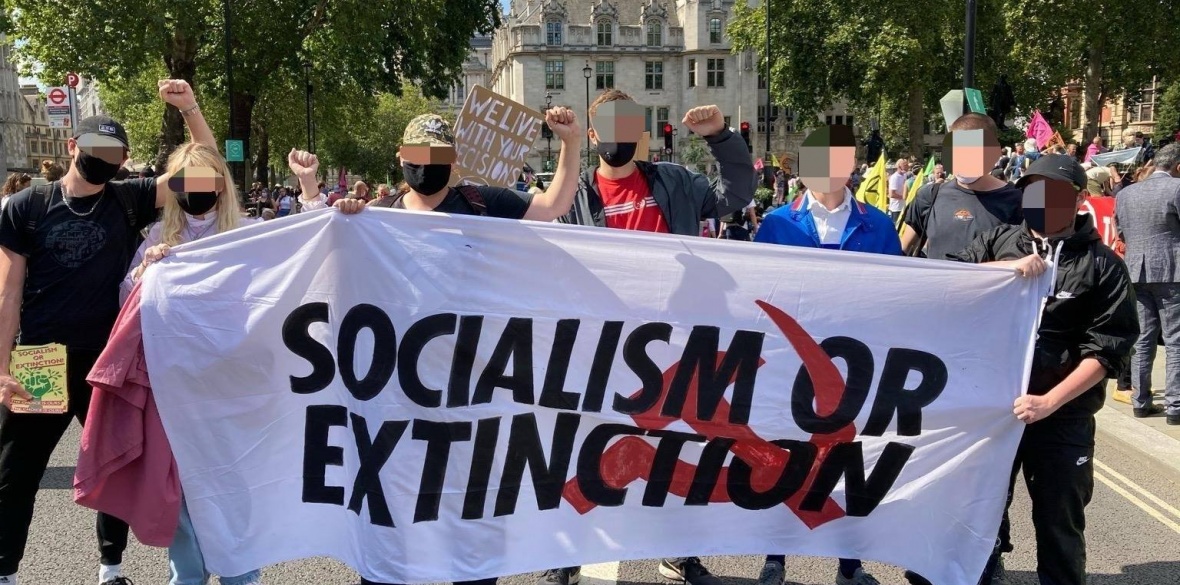EXTINCTION REBELLION’S 10 days of action and the Climate and Ecological Emergency Bill moved in Parliament by Green MP Caroline Lucas have put the climate crisis back in the headlines.
With the government pushing for Britain’s economy to go “back to normal” as lockdown is lifted, these protests are a powerful reminder that “normal” has run out of road — the world is warming at an alarming rate and unless we act we will see devastating consequences.
XR’s direct action strategy has done a huge amount to raise awareness of the crisis.
Yet its approach has a weakness — one summed up in the organisation’s bizarre tweet disowning a banner brought to one of its demos by Young Communist League activists that read “Socialism or Extinction.”
“Just to be clear we are not a socialist movement,” the organisation hastened to declare. “We do not trust any single ideology … a banner saying ‘socialism or extinction’ does not represent us.”
The most generous interpretation of this tweet is that XR wants to build the broadest possible coalition in favour of radical action on the climate, and does not want non-socialists put off.
If so, it was self-defeating: activists from many organisations attend large demonstrations and nobody was likely to assume that the communist banner, emblazoned with a hammer and sickle, spoke for everyone there.
By aggressively rejecting its message, XR achieves the opposite, signalling that not everyone is welcome on its demos. This may be deliberate: the organisation has a number of wealthy backers and it may fear that big money would be withdrawn if it becomes seen as a socialist movement.
The proposal of a citizen’s assembly selected by sortition, frequently made by XR, is linked to its claim to be non-ideological.
But the problem with the assumption that such an assembly could address the climate crisis is the same as that of XR’s whole tweet: it wilfully ignores the central role of the capitalist system in driving climate chaos.
It is capitalism’s requirement for relentless expansion, its exploitation of all natural and human resources for maximum profit, that drives the extracting and logging industries, has created gigantic agribusinesses that fell forests, poison the land and water and tie Third World farmers into dependence on them for seed and fertiliser.
It is reliance on “the market” to deliver solutions that prevents governments from adopting planned, sustainable development and it is the corporate muscle of fossil fuel, aviation, automotive and agricultural firms that stops governments taking action that affects their profits.
Indeed, the reliance on short-term profits yielding dividends to short-term shareholders means many modern corporations are not even run with an eye to their own sustainability, let alone that of the planet.
Appeals to parliaments and presidents to “do something” about climate change will fail if they treat such decision-makers as neutral actors rather than instruments of class power.
It was the willingness to directly challenge corporate interests that allowed Labour under Jeremy Corbyn to outline a green new deal that addressed in detail how goals like reducing emissions could be achieved, for example through a renationalised national grid tasked with delivering a clean energy revolution.
It is the absence of a class-based approach that has ensured most green parties, where they have achieved a measure of political power as in Germany or Ireland, have failed to deliver real change; a reality reflected in Friends of the Earth’s accurate assessment last December that Labour’s manifesto was greener than the Greens’.
People chanting: “System change, not climate change” understand that the economy as currently structured is not capable of averting climate catastrophe. No economy driven by the endless extraction of profit — which is to say no capitalist economy — is capable of it.
The YCL’s banner spoke to that important truth. If XR’s leaders continue to ignore it, all their talk of radical action is just so much hot air.









